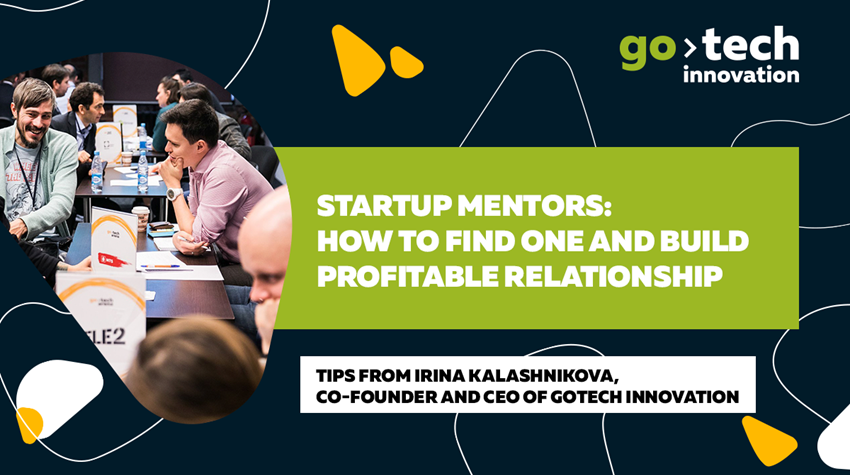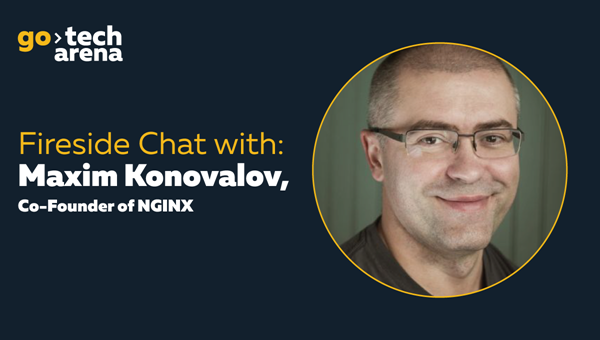10/1/2020
Startup mentors: how to find one and build profitable relationships
Irina Kalashnikova, Co-founder and CEO of GoTech Innovation prepared the most important tips for startups on finding and working with mentors.

Who are mentors?
"They helped shape a clear vision for the future development of our product". This was one of the reviews of the startup's work with mentors, which the GoTech Innovation team received based on the results of the last summer Kaspersky Exploring Russia tourism accelerator. And this is just a small part of what mentors can give startups.
Much has already been said about who mentors are, so we will focus on a small but important set of characteristics. Mentors help startups determine a course of action, develop alternative solutions to problems, fill knowledge gaps, and expand a network of contacts. As a rule, they once were in the place of the startup founder, but now they are already acting in a different role. They have experience in the industry where a startup operates, expertise in a specific area of business that will help a young company grow, and in general, a desire to help develop – professionally and personally.
A mentor is not a life coach, but only an advisor who does not make decisions for you. They let you learn from your earlier mistakes and try to avoid them.
What questions should you ask yourself before looking for a mentor?
Be sure to make a list of questions about your expectations of the mentor. Answers to them will help you not to be disappointed in further cooperation. Here are some of them:
- How much time are you willing to spend with a mentor during a week or a month, how often are you ready to communicate with them remotely, report your results, how quickly do you want them to respond?
- Look at where your company is now. What goals do you set for it and at what stage do you need a mentor to achieve these goals?
- What do you want to achieve as a result of cooperation with a mentor, what are your expectations?
- And, in general, why do you need a mentor?
Where can you find a mentor?
There is no secret or unique solution here. All methods and ways have been known for a long time. Let's list them: events, social networks, professional associations, accelerators, business incubators, programs on entrepreneurship development, networks of university graduates or companies in which you worked.
We have experience working as mentors at conferences and in business accelerator programs. Startup events often feature so-called mentoring sessions. This is an opportunity to present yourself to the mentor in 15-20 minutes. As a rule, startups in these cases make the basic mistake: more than half of the time they formulate what they are doing. With the right preparation, this should take a minute. Further, after a long monologue, the founders expect the mentor to say something in response. But it should be different – you ask questions: with what did you come to the mentor, what is your motivation, what do you want to get from them?
In business accelerators, all the work usually focuses on improving the presentation of projects – packaging them and defining the correct product language. Usually there are mentors with entrepreneurial and investment experience and trackers. The former can give new contacts, while the latter have more control over the plans for the implementation of the program. This was the case in the Finnish-Russian accelerator LevelUp, which we conducted from the Russian side. It was attended by startups that wanted to find entrances to the Finnish market with the help of mentors and then try to attract investments.
In general, the more people you talk to, the more likely you are to find someone willing to mentor you. Do not hesitate and reach out to them yourself. You shouldn't wait for the mentor to notice you. The initiative must come from someone who needs new knowledge and support. But remember: don't ask directly for mentoring right away. It is better to hold several meetings to see if you are both interested in developing further relationships.
Is mentor necessarily a successful entrepreneur?
On the one hand, when looking for a mentor, you can target successful businessmen. Choose leaders, famous entrepreneurs, who have achieved what you want to achieve. Or those you admire. Do not be afraid to contact them. In any case, you will receive some kind of feedback, or even useful contacts. How to get the attention of such a person? Just ask him for advice on solving a problem in your business. If suddenly you managed to hook him, then remember that successful businessmen are very busy people, and they will only help in solving specific problems.
On the other hand, some startups advise against looking for the mentor you are idealizing, since it will be difficult to get quality feedback from them. A good mentor, in their opinion, does not have to be a successful entrepreneur. It is just someone you like. It's a pleasure to spend time with them. You know and feel that they are right for you.
When looking for a mentor, it is necessary to gradually narrow the circle of potential candidates by studying their history and the results they have achieved. It is useful to read materials on their blog or social networks, listen to their public speeches.
Should a mentor be from your field?
It is best to look for someone outside of your industry or expertise. In this case, mentors will be extremely critical of your product and at the same time very helpful. Remember, business principles are universal in many ways. The main thing is to find those who will help in a specific direction – shaping a business strategy, recruiting personnel or perfecting the art of public speaking. You need to understand what skills you want to learn.
Moreover, the mentor can introduce you to specialists from other fields that you need to develop your product. They don't have to have all the answers. A good mentor is someone who can involve other experts in your project.
That's how it turned out with the projects of our company GoTech Innovation – the GoTech contest and the startup scouting system. At the beginning of our journey, our mentors were experts from the venture industry: managing partner of the Runa Capital fund Dmitry Chikhachev and co-founder of the Untitled Ventures Konstantin Sinyushin. We often argued with them, but it was always useful. They gave us new experience, helped us avoid mistakes, expanded our network of contacts and showed us successful examples to strive for.
Is startup experience important for a mentor?
Rather yes, than no. Someone from the corporation will be more focused on management tasks. On the contrary, a mentor who has gone through a startup path is already more adapted to solving diverse problems in building a business. They know what chaos and uncertainty are.
Is a mentor the target audience of your business?
Indeed, this can happen. They can give feedback on the business idea, what they like about it, how they would like it to be sold, how much they were willing to pay for the product, etc. The mentor can test your solution internally for the correct concept.
Is a mentor the one who says how to do it, or the one who asks the questions?
You do not need mentors who will immediately give you fish instead of teaching how to catch it. This path, as practice shows, will inadvertently lead a startup to failure.
Mentor that asks questions, on the other hand, teaches a startup to question its steps and seek an evidence base for them. Correct answers will come from qualitative analysis and collection of material.
These two approaches are very helpful when choosing a mentor. At the time of acquaintance, check them: see who will say exactly how to act, and who will teach how to think. For example, when meeting with a potential mentor, you can ask them a question about your startup - ask them to share their opinion on some problem that you are currently solving. The right mentor will ask: what have you done to answer yourself this question? And if the mentor begins to talk about their many years of experience in this industry and on its basis give you their opinion, then it is better to run away from them as soon as possible.
You need a mentor who doesn't sugarcoat things, who is willing to tell the truth. And don't choose someone who always says yes. A startup is always the one who is responsible for mistakes made on the advice of a mentor.
Be useful to each other
You need to be someone with whom the mentor is interested to work. Cooperation should not be one-sided. It should be remembered that not only the mentor helps you, but you help the mentor learn something new about their specialization in business, no matter how successful of an entrepreneur they are. Look for someone with whom you feel confident building your business. Charge them with your energy! Show your passion!














